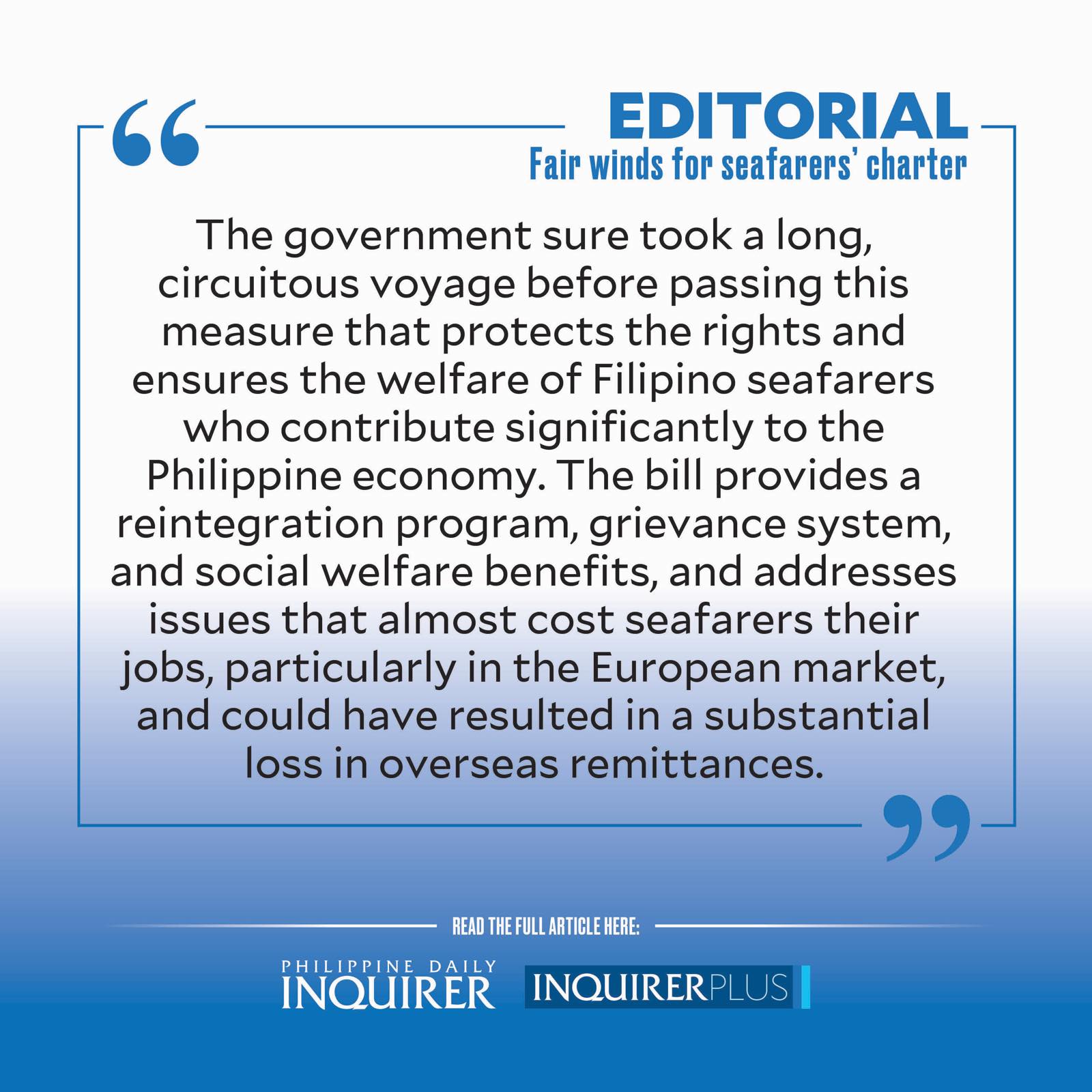
The Magna Carta of Filipino Seafarers has finally sailed through Congress and is now awaiting the signature of President Marcos who certified the bill as urgent earlier this year.
In Sen. Raffy Tulfo’s words, this concludes the bill’s “long and turbulent journey” over 16 years. The government sure took a long, circuitous voyage before passing this measure that protects the rights and ensures the welfare of Filipino seafarers who contribute significantly to the Philippine economy. Among others, the bill provides a reintegration program, grievance system, and social welfare benefits, and addresses issues that almost cost seafarers their jobs, particularly in the European market, and could have resulted in a substantial loss in overseas remittances.
In 2006, the European Maritime Safety Agency’s (Emsa) audit found that Philippine maritime schools were not compliant with international standards of training and education as mandated by the International Convention on Standards of Training, Certification and Watchkeeping for Seafarers. In December 2021, the European Commission issued an ultimatum: it would ban Filipino seafarers because the issues cited in that Emsa audit have not been addressed. That ban would have put at risk about 50,000 seafarers working on EU-flagged ships but the plan was dropped in March this year after the Marcos administration outlined the steps that have been taken to address the concerns.
Primary source of maritime manpowerThe Philippines is a primary source of maritime manpower, supplying 25 percent of the world’s seafarers; last year, they sent home $6.71 billion worth of remittances. As Tulfo noted in his sponsorship speech, becoming a seafarer has become a desirable profession for those who want to secure better-paying jobs—a messman, the lowest rank in a ship, earns at least P78,000 to as high as P140,000, a salary that is impossible to get from local jobs. But this demand has given rise to fly-by-night maritime schools that were not compliant with international standards. This abuse, on top of the abuses that Filipino seafarers suffer once they are onboard (“nakasampa”), has made it imperative to make them more viable globally especially since ships have been hiring more seamen from Vietnam, Myanmar, and China.
Aside from helping Filipino seafarers become more competitive, the Magna Carta secures their rights to self-organization and collective bargaining, and to decent, just, and humane conditions aboard sea-going vessels, including protection from all forms of harassment and bullying, and free legal representation for victims of faulty contracts.
Acts of piracy or armed robberyAnother important provision is the right to immediate medical attention, including the provision of first aid, adequate medical services, medicines, and medical supplies onboard as well as access to shore-based medical facilities. In case of a pandemic/epidemic, the bill mandates shipowners or manning agencies to shoulder expenses for medical care and board and lodging until the seafarers have been repatriated, and for the government to take over from there. During the COVID-19 pandemic, an estimated 100,000 seafarers working on cruise, cargo, and fishing ships lost their jobs; many of them were stranded aboard ships or ports overseas and the lack of legal recourse as well as delay in government assistance made their situation worse. The same condition applies to maritime accidents or deaths.
The bill also specifically disallows repatriation waivers when a seafarer is abandoned, held captive on or off the ship as a result of acts of piracy or armed robbery against the ship, or is incapable of traveling due to illness, injury, or incapacity. This is relevant as many cargo ships face pirate attacks on the high seas, putting at risk their crew. Last month, Iran-backed Houthis seized an Israel-owned and Japan-operated cargo ship with 17 Filipino seafarers onboard. The government is still working on their release.
Lackadaisical implementationThere is also a specific section mandating shipowners, manning agencies, and maritime training institutions to formulate and implement policies on gender and development and protect women seafarers against gender-based discriminatory practices such as lower compensation and lesser fringe benefits as well as undue advantage given to male seafarers in promotion and training opportunities.
The Magna Carta of Filipino Seafarers, as reflected in its many other provisions, is rooted in good intentions. But its effectiveness will largely depend on the implementation, which rests on, among others, the Commission on Higher Education and the Maritime Industry Authority to regulate maritime schools and ensure that they conform to international standards; and the Department of Labor and Employment and the Department of Migrant Workers to make sure that seafarers have decent working and living conditions and to consistently review terms of employment.
May this measure not be afflicted with lackadaisical implementation and instead encounter, as mariners say, fair winds and following seas.